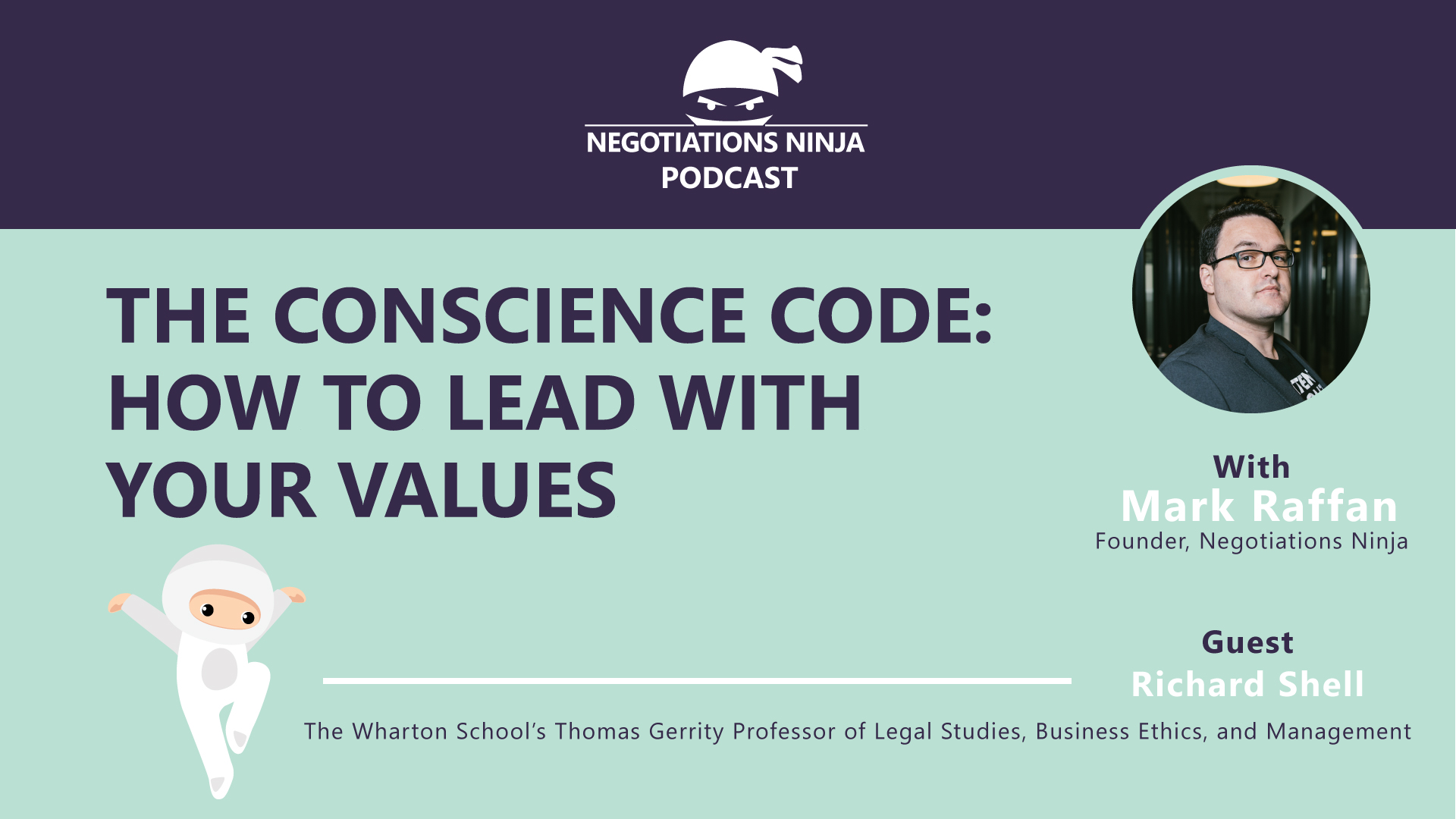How do you negotiate with your values in your organization? How do you learn to recognize the values that are important to others and let them guide your actions? How do you balance integrity with a successful career? These are just a few of the questions that Professor and Author G. Richard Shell answers in this fascinating episode of the Negotiations Ninja podcast!
Outline of This Episode
- [1:24] Learn more about Richard Shell
- [2:47] The evolution of Richard’s work
- [11:03] How do we know someone’s values?
- [16:14] Internal conflict in negotiation
- [26:11] How to discover your values
- [35:33] How to connect with Richard
How do we know someone’s values?
Richard shares that the book “Mindwise” by Nicholas Epley is all about how to read other people. He spends nine chapters talking about how difficult and impossible it is. Then in the 10th chapter, he points out that the answer is simple. If you want to know what someone is thinking, you have to ask.
In a negotiation, there will be many differences that have to do with culture, background, assumptions, training, etc. There are infinite inputs that change someone’s values. You may suddenly discover that you aren’t getting the full story. Richard emphasizes that you can’t allow yourself to become self-righteous and think that they’re a bad person because they don’t share your same values. You can’t assume that what they’re doing is unethical or illegal because it doesn’t match your values. If you do, you’ll likely do something that works against your own interests.
Be a person of conscience
Having your values tested is a classic problem. A person of conscience doesn’t start bluffing when someone else does. The artful way to manage differing values is to share your perception that the information isn’t being presented clearly. You can ask what the other person’s ideas are to foster and build an environment of trust. This allows you both to be more transparent. You’re showing them a joint goal to find better value.
One of the beauties of being more self-aware is that you’re less inclined to mimic the behavior of the other party and more inclined to take a leadership role in the process. Why? Because values and principles are non-negotiable. Once you have the non-negotiable boundary, you negotiate around that constraint.
If they have all the leverage, then you still don’t compromise your standards—but you do your best to improve your leverage. If you can’t, you take what you can get and don’t repeat the experience.
Internal conflict in negotiation
Richard points out that there are three legitimate schools of ethical negotiation: competitive, idealistic, and pragmatic. If you’re in a market where bluffing is expected, there’s no violation of values when you bluff. That’s the way it works—those are the values in that industry. Even someone who is a competitive negotiator will run into something that runs against their values, a range of tools that someone else may consider unethical.
Richard believes that you have to be aware of other people’s values while being true to yours. If there is a conflict, then it’s helpful to identify and try and minimize it. Don’t let yourself attribute evil character to someone different than you are. Focus on the problem, who the other people are, and how you can work together to solve that problem. Sometimes, it requires you to know that your values will make it hard to trust someone.
Negotiating a difference of beliefs
Interests are things that can be traded or reallocated over time. Differences over beliefs are much more difficult to overcome. Richard has never heard of someone being persuaded to change an important belief. He notes that people do change their beliefs—but it isn’t because someone makes a persuasive argument.
You provide arguments, evidence, justifications, rationales, stories, etc. that allow them to change their own beliefs. You plant the seed and give someone time for their subconscious mind to mull it over and integrate it into their existing set of beliefs. Then they experience it as their own idea. The art of effectiveness is to let them take the credit. Richard jokes there’s a quote in DC that goes, “You can get almost anything done in DC if you’re willing to let someone else take credit for it.”
Negotiating over differences of beliefs is quite a different process than negotiating over principles. If you think you’re negotiating interests, but someone is telling you it’s a matter of principle, you’re likely insulting them by saying, “Let’s split the difference between our principles.” It’s not about meeting halfway; it’s about a belief. You can agree to disagree. You can ask them what it would take to change their mind.
To hear the full conversation about how to negotiate with your values, listen to the whole episode!
Resources & People Mentioned
- Marty Latz episode
- Michael Wheeler episode
- The Six Lives Exercise
- Conflict Styles Quiz
- BOOK: Mindwise
Connect with Richard Shell
- Connect on LinkedIn
- Richard’s Personal Website
- BOOK: Bargaining for Advantage
- BOOK: The Art of Woo
- BOOK: Springboard
- BOOK: The Conscience Code
Connect With Mark
- Follow Negotiations Ninja on Twitter: @NegotiationPod
- Connect with Mark on LinkedIn
- Follow Negotiations Ninja on LinkedIn
- Connect on Instagram: @NegotiationPod
- negotiations.ninja




